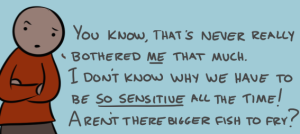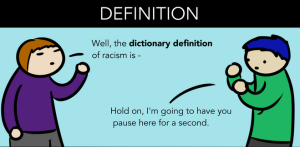
Source: Feminspire
I was one of those kids that was always so worried about getting through college that I never gave much thought to what would happen after college.
(And yes, I realize that it sounds counterintuitive to use the institution that’s supposed to be preparing you for a career as a rationale for why you never contemplated the reality or the difficulty of actually starting said career.)
But before I knew it, graduation was around the corner. And even then, I wasn’t thinking of the ominous “future.” It was all about graduation – the celebration, the pats on the back, the sadness of saying goodbye to your friends.
As much as I complained about college, it’s true that it was pretty straightforward in the sense that you constantly had a structure telling you what you needed to do and when you needed to do it by.
You had a fairly controlled environment in which you have at least some degree of agency over whether and how you’ll succeed.
And then, all of a sudden you’re on your own thinking “Now what?”
Graduating makes you a little fish in a big pond in the broadest sense.
I had heard through the grapevine that several of my friends had been offered jobs before the semester even finished, which made me feel inadequate by comparison. Nonetheless, I reassured myself that finishing strong academically was more important than ensuring that I immediately entered the workforce.
That summer was a frenetic haze of alternately applying for any job I could find and sulking in front of Netflix for days, unwilling to even think the word “resume” or “application.”
Well, that was seven months ago.
As much as I wish I could put an exciting update here, I can’t because I’m still more or less in the same boat, at least on paper.
I’ll be blunt here and admit that I still have no idea where the next few months are headed. If anything, it’s the nebulous lack of certainty or definitive benchmarks that can eat at you the most.
So what has changed? And what can you do if you find yourself in the same boat?
Listen to Yourself
At this point, we may feel like we are at a crossroads in life. And unemployment may mean that we’re totally isolated from networking and making new friends.
And while I don’t recommend becoming completely introverted, it is a good idea to use this time to become more in tune with yourself.
To some extent, you have to be your own cheerleader and confidant.
One of the things that can be the hardest to learn is that you can’t expect everyone else to have the answers. Your family and friends may want to help (sometimes too much), but you can’t expect them to dictate something as sprawling as your career choice and life trajectory.
Part of that is letting go of the fear of being accountable for any potential shortcomings. Feelings of failure can be a pretty strong motivator for inaction, especially when your confidence is already bruised by long-term unemployment.
If we let someone else decide what to do for us, any negative consequences can’t possibly be our fault and the blow to our self-esteem is softened.
Regardless, try to remember that getting a job and choosing a career is all about your actively making decisions to choose who you want to be. Even if it means being temporarily underemployed, think of as it an investment in your future.
We’ve been conditioned to constantly seek approval of others, but ultimately, you’re the one who has to own up to your own choices. Don’t allow someone else to influence your path just because it feels comfortable in the moment.
Decide When You Want Advice – And When You Don’t
Given that you’re unemployed and possibly have a lot of time on your hands, people around you will often interpret this perceived lack of productivity or direction as a signal that you need their advice.
Advice can be great!
There are all kinds of professionals out there who have the tools to help guide you onto your next step. Informal advice from your loved ones can also be a fantastic source of strength and support when you’re feeling down.
With that said, I’ve found that the vast majority of advice is unsolicited and, consequently, irritating.
Sometimes you need an outside perspective to look at the situation from a different angle. Unfortunately, this can also mean that the person comes off as incredibly trivializing or condescending.
They can make you feel worse about your circumstances precisely because they don’t know or understand all the factors that have produced your current scenario.
I can’t tell you the number of times in the past nine months that even the most well-intentioned people have said to me, “But can’t you just [insert fairly obvious, easy solution here]?”
No, I can’t. I’ve probably run that solution through ten different scenarios in my mind in an attempt to get it to work.
Rubbing salt in the wound by reminding me that the unattainable is right in front of my face not only makes me feel that much more miserable about my situation, but it also inspires an intense desire not to interact with you because I feel like you’re going to be silently judging me the whole time.
You don’t want your circumstances to put a strain on your relationships.
But the steady stream of advice never seems to stop, so you just have to get better at knowing when to listen and when to check out.
Logically you might feel compelled to listen to everyone if you’re fighting that gnawing sense of failure, but trying to incorporate multiple (often contradictory) opinions into your future goals is only going to overwhelm you more than you already are.
Trust yourself to gravitate towards ideas that appeal to you. As for everything else, just let it go.
Socialize, But Avoid Triggering Situations
Arguably the biggest culture shock of graduating college is suddenly being plucked out of an environment surrounded by people who are either your age or in your peer group. It can be very disconcerting to be stripped of such a fundamental social structure so quickly.
You might not even think about it until after it’s happened. You take the college atmosphere for granted.
Now you don’t have anyone for company. Sure, you might have your parents, your roommates, or a partner, but that’s very little variety and tensions run high if you’re spending tons of time together.
Understandably, you could be craving re-connection with old friends or meeting fresh new faces.
This time in our lives can make even general conversation painfully awkward, as most basic small-talk revolves around work or school. It’s always uncomfortable to admit you’re not involved in either, especially since failure to adhere to culturally legible standards of progress often marks you as lazy or just plain weird.
Let’s face it, it’s not exactly impressive to talk about that new TV show you’ve been marathoning or how few times a week you actually put on clothes that aren’t sweatpants. To be frank, conversation fizzles out because you just don’t have that much going on, or at least not things that are perceived as a valuable use of energy.
(Not to mention the fact that being unemployed means that you may not have the money to put yourself in social environments to begin with.)
I became gradually more embarrassed and eventually dreaded talking even to close friends. It felt as though I was disappointing everyone, like my life was becoming more puzzling and nonsensical to my inner circles with each passing week.
The subtext of the most banal conversation still taunts me with the question, “What are you doing, and why aren’t things changing?”
So I shut people out, because I couldn’t stop myself from projecting my own insecurities onto others.
But this only exacerbates feelings of isolation that already do a number on your self-worth.
Socialization is an essential human craving. Don’t deprive yourself of it because you’re worried you might not measure up.
Find new friends to start a new chapter with. Go online. Pick up a new hobby. Start that novel you’ve been procrastinating. Recognize the liberation inherent in the ability to shape your own schedule independently of imposed timelines.
And if you know that certain people are going to trigger negative feelings about your situation, avoid them altogether or choose to only talk to them about things unrelated to school and work.
Being unemployed doesn’t make you unworthy of enjoying life.
Know That Now Isn’t Forever
Trust me, I know how much the vortex of unemployment can seem insufferable and occasionally indefinite.
But it’s important to remind yourself that your circumstances are temporary, even if they don’t change as quickly as you would like.
It sounds cliché, but remembering the future will motivate you to continue to put yourself out there and prevent you from being stuck in an endless cycle of frustration.
***
You don’t have to punish yourself for being unemployed. Get out there and relish the break.
No matter how much extra time you have, you should still prioritize self-care, rather than spend your unoccupied hours wallowing in self-loathing or worrying about what you haven’t accomplished.
You may not be spending this phase of your life doing what you want to be doing. The bitterness of that disappointment takes a while to get over.
Make things easier on yourself by embracing the unknown.
Pause, take a deep breath, and challenge yourself to take advantage of your unexpected opportunity.
[do_widget id=”text-101″]
Erin Tatum is a Contributing Writer at Everyday Feminism. She’s a feminist, queer theory lover, and television enthusiast living in Pennsylvania. She is particularly interested in examining the representation of marginalized identities in media. In addition to Everyday Feminism, she’s also a weekly contributor to Bitch Flicks. Follow her on Twitter @ErinTatum91 and read her articles here.
Search our 3000+ articles!
Read our articles about:
Our online racial justice training
Used by hundreds of universities, non-profits, and businesses.
Click to learn more
Most Read Articles
- « Previous
- 1
- …
- 30
- 31
- 32



















